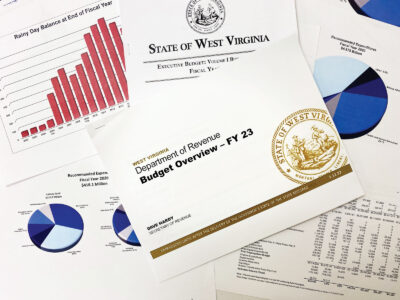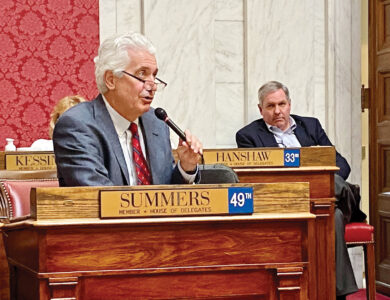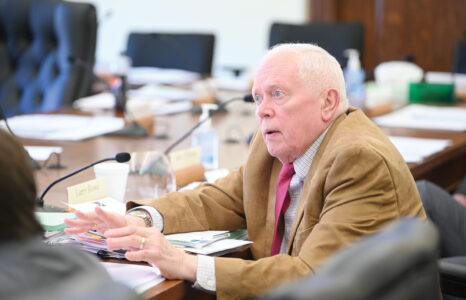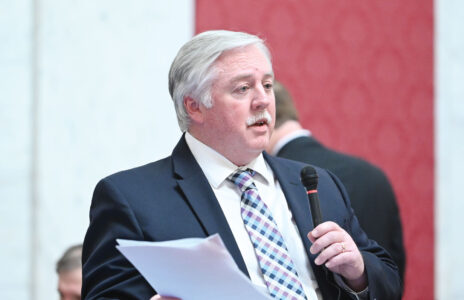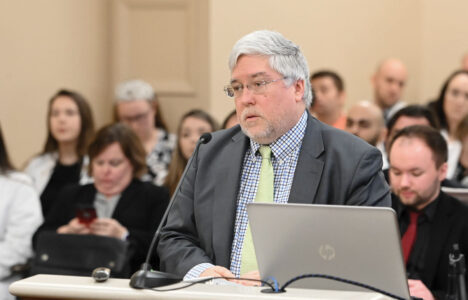In the Balance: Lawmakers consider changes to crafting West Virginia’s budget
- (Photo by Steven Allen Adams)
- Department of Revenue Cabinet Secretary Dave Hardy said the state’s projected $1.2 billion budget surplus is historic. (Photo by Steven Allen Adams)
- Delegate Larry Rowe believes that revenue estimates should be within 20 percent of projections. (Photo courtesy of WV Legislative Photography)
- House Finance Committee Chairman Eric Householder said the Legislature needs to take a more proactive approach in crafting the general revenue budget. (Photo courtesy of WV Legislative Photography)
- Attorney General Patrick Morrisey said the state shouldn’t let pending litigation scare it from tax reform. (Photo courtesy of WV Legislative Photography)

(Photo by Steven Allen Adams)
CHARLESTON — Revenue officials estimate West Virginia is set to end the fiscal year on June 30 with more than $1.2 billion dollars in surplus tax collections, causing some Republican lawmakers to ponder how the general revenue budgets are crafted and how to provide tax relief.
At a meeting June 13 of the West Virginia Legislature’s Joint Committee on Finance during the interim meetings, Department of Revenue Secretary Dave Hardy told lawmakers the state’s general revenue tax collection surplus as of Monday was $1.18 billion, up from $1.11 billion on June 1.
The general revenue budget represents just one quarter of the state’s $19 billion budget, consisting of federal funds, special revenue funds, the State Road Fund and lottery funds. But the general revenue budget is the one area the governor and the Legislature can exert control and influence.
Number crunchers in the Department of Revenue develop a revenue estimate for the new fiscal year for which the general revenue budget is based. For the upcoming fiscal year 2023 beginning July 1, that estimate was $4.645 billion. The budget that was approved by the Legislature and Gov. Jim Justice came in $10 million less at $4.635 billion.
The revenue estimate is updated again at the beginning of the new fiscal year on July 1 and can be periodically revised through the fiscal year to reflect changing economic conditions. The revenue estimate for the current fiscal year was revised again in January.
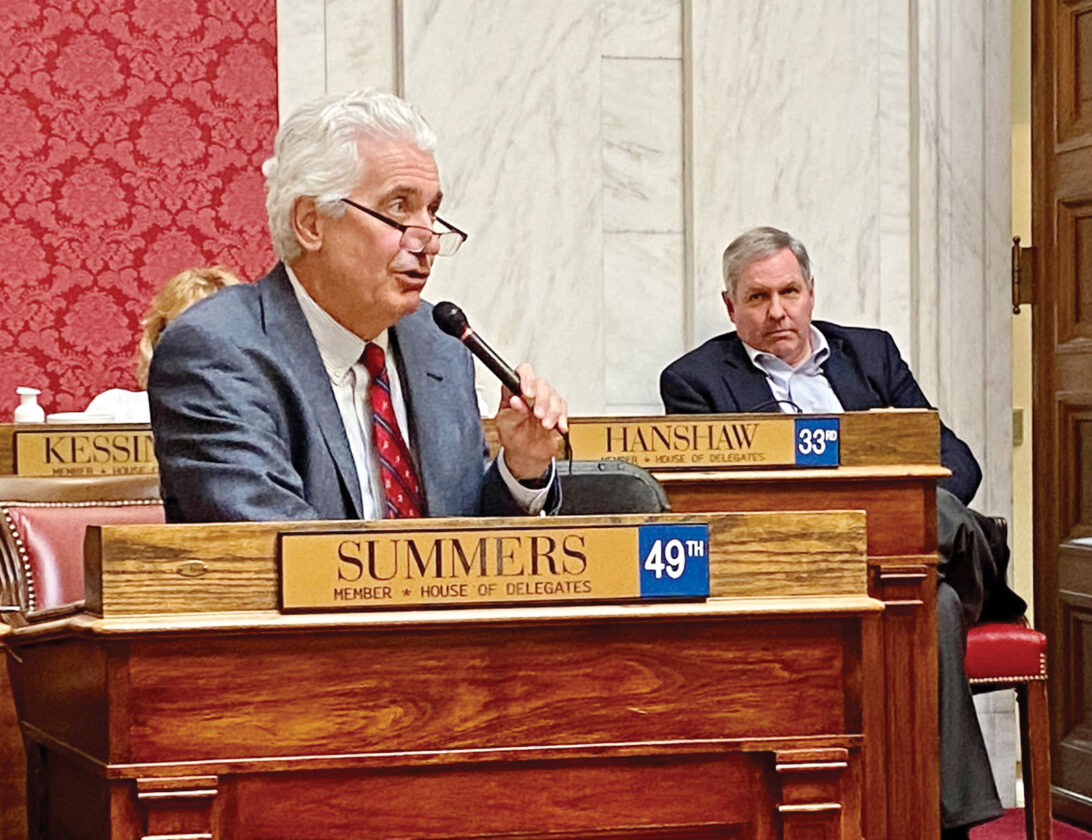
Department of Revenue Cabinet Secretary Dave Hardy said the state’s projected $1.2 billion budget surplus is historic. (Photo by Steven Allen Adams)
Coming in above the revenue estimate is always the goal of state government with the state being legally required to end each fiscal year with a balanced budget in the black. In the past during bad financial times, governors had to meet this goal through mid-year budget cuts on state agencies, raiding the two revenue shortfall funds, known together as the Rainy Day Fund, or even raising taxes.
But when tax collections are up, the budget can stay in the black without the need for drastic measures. Since 2018, the Justice administration has enjoyed improving collections in the personal income tax, consumer sales and use tax, and the corporate net income tax. Even as collections for the coal and natural gas severance tax sagged in the latter part of the last decade, the other tax income streams have helped the state.
Yet, ending a fiscal year with $1 billion is unheard of, let alone ending the year with more than $1.2 billion. Speaking after Monday’s committee meeting, Hardy said it was “historic” and something that the wonks in the State Budget Office simply couldn’t predict given that two years ago, the state moved the income tax deadline from April to June during the shutdown of businesses at the start of the COVID-19 outbreak in 2020.
“I think the most important thing to remember is that we are in a very historical time right now,” Hardy said. “Nobody could have seen this coming two years ago.”
While there are many factors contributing to the state’s massive tax surplus, historic levels of federal funding due to the COVID-19 pandemic, inflation driving up the cost of products driving sales tax revenue, higher demand for coal and natural gas overseas, Hardy also attributes the surplus to the governor and the Legislature keeping the general revenue budget flat without any recurring increases.
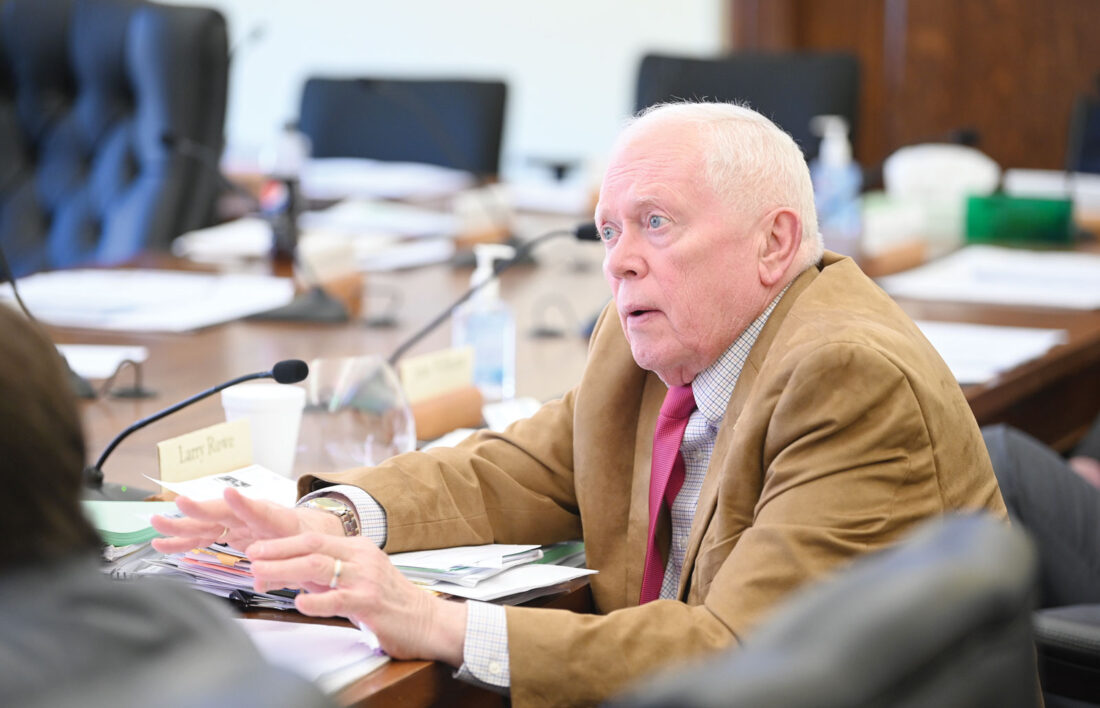
Delegate Larry Rowe believes that revenue estimates should be within 20 percent of projections. (Photo courtesy of WV Legislative Photography)
“Base building for budgeting is very dangerous once you commit to an expense today, you commit to it forever,” Hardy said. “Your household has fixed expenses and variable expenses. Well, base building is a fixed expense. You can’t get out of it. Right? We have not. We, being the governor through his budget, and the Legislature through approving the Governor’s budgets, have not done base building, so that’s why we’re ringing up a very large surplus.”
The state no longer provides six-year financial plans, but according to a previous six-year plan that projects estimated revenue and the base budget totals through 2024, the state estimated $5.28 billion in tax revenue for the current fiscal year, nearly 1 percent less than the $5.23 billion collected as of the end of May.
Hardy said the $1.2 billion budget surplus is like someone receiving a bonus check. It’s a one-time benefit that someone wouldn’t expect to get the following year. Hardy said the state should not raise their revenue estimate based on surplus dollars. However, some lawmakers are wondering if the state should change the way it budgets and estimates revenue.
***
The way the state creates the general revenue budget and revenue estimates is tied to the ratification of the Modern Budget Amendment by voters in 1968. Before the amendment, the budget was developed by the Board of Public Works, consisting of the Governor, Secretary of State, Attorney General. State Auditor, State Treasurer, and Agriculture Commissioner.
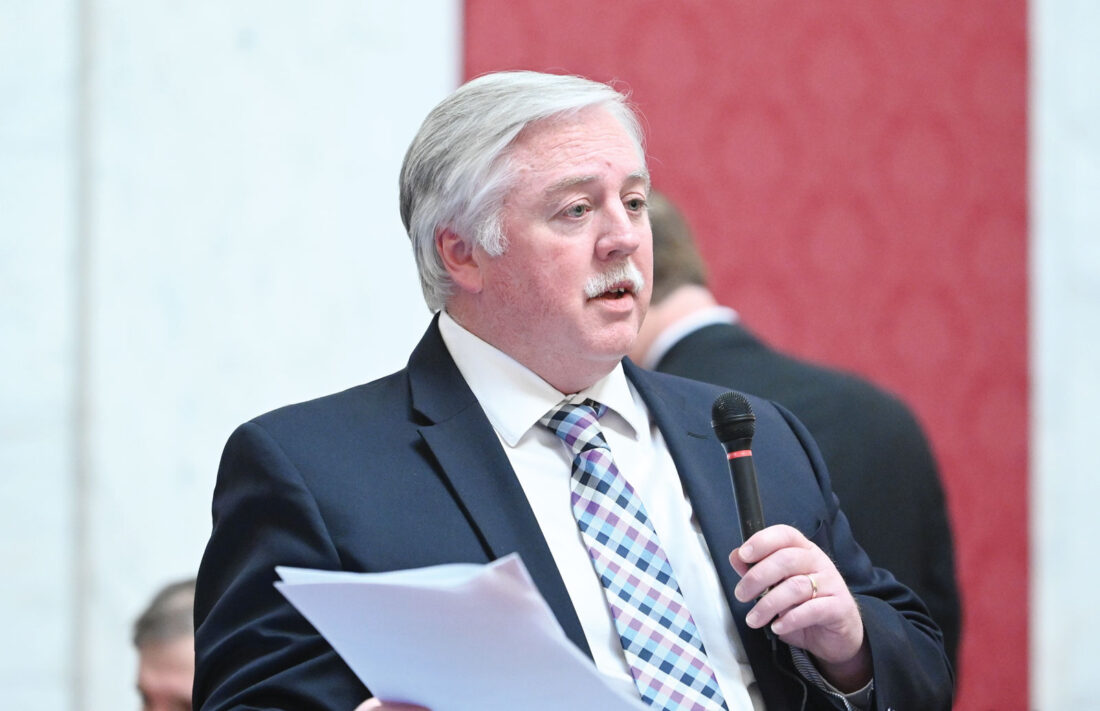
House Finance Committee Chairman Eric Householder said the Legislature needs to take a more proactive approach in crafting the general revenue budget. (Photo courtesy of WV Legislative Photography)
Gov. Arch Moore was the first governor to exercise his budgeting authority under the Modern Budget Amendment. It gives the governor the power to create the budget and submit it to the Legislature. It also gives the governor the authority to develop the revenue estimates.
Delegate Larry Rowe, D-Kanawha, is a member of the House Finance Committee. He also is an attorney and a historian. Rowe has served off and on in the House of Delegates since 1997 and has seen Democratic and Republican governors tweak revenue estimates depending on what their goals are.
“All of the governors since the constitutional amendment was passed have done that,” Rowe said in an interview on the House floor Monday. “Gov. Moore, I recollect, was really adept at adjusting the numbers to either increase them and allow certain programs to be budgeted as a part of the main process.”
When lawmakers amend the budget, they can develop a budget less than the governor’s budget, but they cannot exceed the revenue estimate. The governor can also do line-item vetoes of items in the budget.
“The governor has the right to do it,” Rowe said. “The budget was such a mess whenever we passed the constitutional amendment that we allowed him a red line-item veto of anything in the budget that he doesn’t like. We give the governor a lot of power in the budget and I think it’s the right thing to do.”
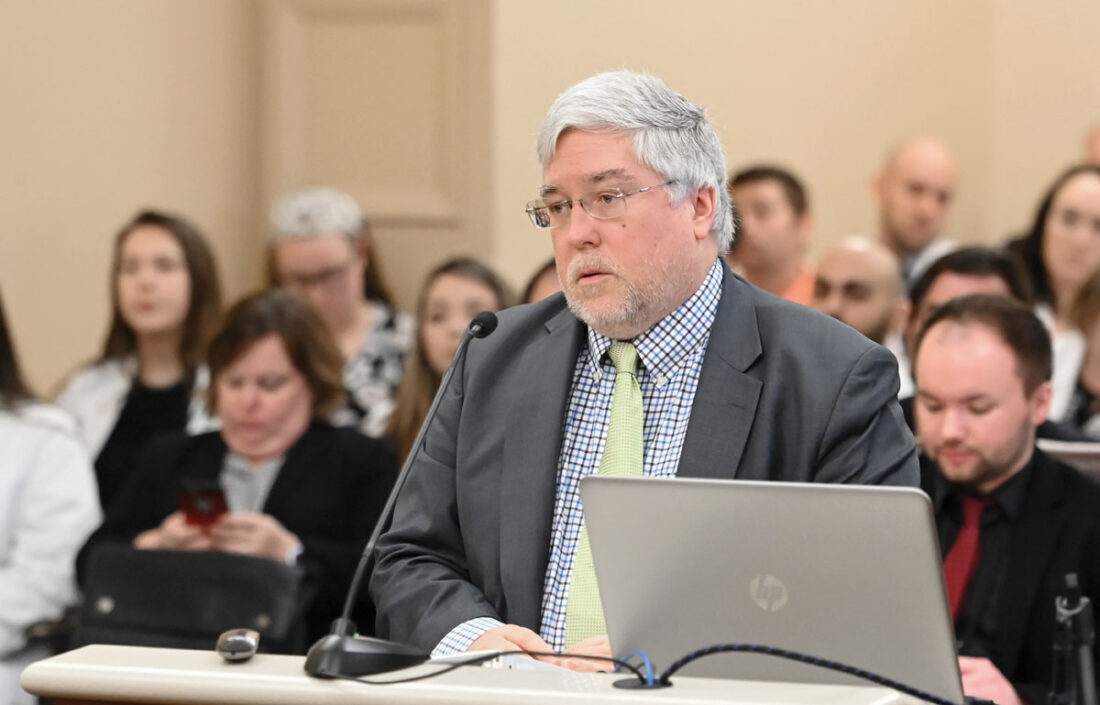
Attorney General Patrick Morrisey said the state shouldn’t let pending litigation scare it from tax reform. (Photo courtesy of WV Legislative Photography)
However, Rowe thinks that the Governor’s Office should be required to get revenue estimates within 20-percent of accuracy. He also decried the efforts over the years to place certain one-time expenditures in a section of the general revenue budget to be funded by surplus tax revenue available at the end of a fiscal year. There are $793 million of items in the new fiscal year budget in the surplus section of the budget that will be funded.
“In terms of just the revenue estimates now, it seems to be that we’re pushing everything to the back of the budget and funding programs that are favorites of leadership, assuming that the budget comes in at a higher amount with higher revenues than what we had predicted,” Rowe said. “I don’t know that it’s something to be fixed, but it’s something to be mindful of.”
***
House Finance Committee Chairman Eric Householder, R-Berkeley, believes the Legislature needs to take a more proactive role in helping craft the general revenue budget instead of waiting until the yearly legislative session.
Householder said by the time lawmakers get the budget handed to it by the Governor during the annual State of the State address in January, it’s too late to make major changes, while officials in the Governor’s Office begin working with state agencies on crafting the budget every August.
“The Legislature is behind the eight ball, so to speak, when we step in on day one of the legislative session, because the governor has already met with the state agencies to go over the budget,” Householder said in an interview Monday in his Capitol office. “We should be meeting monthly, having a budget committee to be reviewing these state agencies’ budgets monthly, because obviously they’re presenting their needs.”
Householder also believes that instead of waiting to receive the budget bill from the governor and amending it, the Legislature should be crafting its own budget. The Modern Budget Amendment largely ties the hands of the Legislature, but Householder said lawmakers could still be more proactive.
“In a lot of states, the legislature sets and crafts their own budget,” Householder said. “We only have a finite number of dollars that come in every year for revenue. We know what those finite numbers of dollars are. We should sit down as the Legislature and say OK, what are the budget priorities of the state? What are we willing to spend money for? Then once you have those priorities set, then you know how much money that you’re going to be able to spend for each one of these areas.”
The other thing that both the Legislature and the Justice can do is engage in some kind of long-term tax relief for West Virginians. Householder was the lead sponsor of a bill to cut personal income tax rates across the board. The bill passed the House but was never taken up by the state Senate. Justice also used his line-item veto to remove funding in the surplus section of the budget for a fund designed to cushion fluctuations in the economy that could affect future tax cuts.
Two years earlier, with the House on one side and Justice and the Senate on the other, an effort to phase out the personal income tax failed when both sides could not agree on the best way to do that. But Republicans are considering different kinds of tax relief, including focusing on an amendment on the November ballot that would change state constitutional language to allow lawmakers to reduce or phase out property taxes.
According to an analysis of data released Monday by the West Virginia Association of Counties to show the effect that Amendment 1 would have on certain kinds of personal property, the combined total property tax assessments for all 55 counties in fiscal year 2021 was more than $515.2 million, though it is unclear whether the counties collected close to that assessment total. Amendment 1 would allow lawmakers to lower or reduce property taxes on machinery and equipment, furniture and fixtures, leasehold investments, computer equipment, inventory, and vehicles.
Householder said it is important for more data to come in and for lawmakers to work with counties on a plan, should Amendment 1 pass, to begin phasing out certain property taxes while ensuring counties remain funded. Householder also said the state should put some surplus tax dollars in a fund that can make counties whole and show county government that lawmakers are serious about keeping them whole.
“It’s imperative that we sit down and figure out a way moving forward,” Householder said. “We have one time to do this and to do this right. I think we should sit down with stakeholders. Let’s get a jump on it, let’s be prudent, and let’s start saving for it.”
***
While Justice was motivated to phase out the personal income tax two years ago and remains supportive of tax cuts today, he has been more cautious about pushing for tax cuts.
Part of that fear comes from provisions in the $1.9 trillion federal American Rescue Plan Act that prohibit states from directly or indirectly lowering tax rates after receiving their state allotments. West Virginia received $1.35 billion in direct state funding, receiving its second tranche of funds last month.
Justice said in a virtual briefing earlier this month that he doesn’t want to put the state in a position of having the $1.35 billion clawed back by the U.S. Treasury Department.
“I love the fact that we’re reducing taxes, but whatever we do, we cannot break the law to where there is clawbacks,” Justice said. “A clawback can cause us all kinds of issues that would really hurt us.”
But Attorney General Patrick Morrisey said the only thing the state has to fear from lowering tax rates is fear itself. Morrisey led a multi-state coalition last year in a federal court in Alabama to stop enforcement of the ARPA/Treasury tax cut prohibitions. The federal court stayed enforcement of the provision and a federal appeals court will hear arguments in September.
“We’ve always argued that this provision is ambiguous and very far reaching compared to any other direct restraint on spending that we’ve seen from the federal government in the past. It’s unprecedented,” Morrisey said. “We’ve argued that this provision is coercive, because it’s forcing a state when they accept a massive amount of federal largess to give up its core constitutional power.”
While Morrisey can’t predict how an appeals court will rule or if a future decision is appealed to the U.S. Supreme Court, he believes that should not prevent the governor and Legislature from considering tax reform.
“I think the state needs to be cautious and in terms of how it goes about making the changes, being mindful that there’s a looming case out there,” Morrisey said. “At the same time, we believe we have a strong chance of winning and we can’t be paralyzed for the next five to six years.
“I would adapt to what Gov. Justice has talked about years ago: We need to go big,” Morrisey continued. “We do need to take steps to actually make our state more competitive with the other states around us. I’ve argued in favor of an income tax cut. I’ve been very clear about that. I think we should try to advance that, but what we can also do is we can take steps that advance those goals, but also be pragmatic and put some money to the side in case there is a problem.”
Steven Allen Adams can be reached at sadams@newsandsentinel.com.

